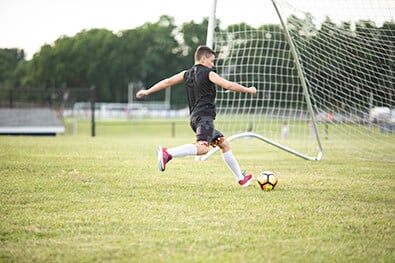ACL Prepare to Play
Specialized treatment to prevent ACL tears

One of the most devastating injuries in sports today is an anterior cruciate ligament (ACL) tear. The ACL is one of the bands of ligaments that connect the thigh bone to the shin bone at the knee.
Most tears are a result of landing or planting and cutting or pivoting actions often seen in sports including football, ice hockey and soccer.
We offer an exclusive, evidence-informed ACL Prepare to Play program aimed at injury prevention.
The program was developed by a team of clinical specialists who identified movement patterns that put an athlete at risk. They crafted a program that helps build strength, agility and endurance, ultimately helping prevent ACL injuries. We want to help athletes like you prevent injury and improve performance.
How ACL Prepare to Play helps
An ACL tear is common among athletes, especially young females.1 There are more than 200,000 ACL injuries in youth athletics in the United States each year.2 Approximately 70 to 80% of these injuries are non-contact in nature and may be largely preventable.3
ACL Prepare to Play creates a foundation for athletic success. It uses standardized equipment and exercises for your pre- and post-practice routine.
The program focuses on:
- Movement, balance and agility training
- Strength and conditioning
- Endurance and performance training
- Posture and alignment
Our team of experienced licensed physical therapists and athletic trainers will work closely with you on improving your movement patterns to avoid ACL injury and meet your goals.
We will provide with you standardized, progressive exercises that ensure optimal outcomes. We will also offer exercises videos, additional information and the latest research on ACL injury prevention to keep you safe.
We want to ensure you are game-day ready and performing at your peak potential. Let us help you do that by avoiding ACL injury.
References:
- (2016). “The female ACL: Why is it more prone to injury?” Journal of Orthopaedics, Volume 13 (Issue 2), Pages A1-A4
- Raines B.T., Naclerio E., Sherman S.L. (2017). “Management of Anterior Cruciate Ligament Injury: What's In and What's Out?” Indian Journal of Orthopaedics, Volume 51 (Issue 5), Pages 563-575
- Ali N., & Rouhi G. (2010). “Barriers to Predicting the Mechanisms and Risk Factors of Non-Contact Anterior Cruciate Ligament Injury” The Open Biomedical Engineering Journal, Volume 4, Pages 178-189
